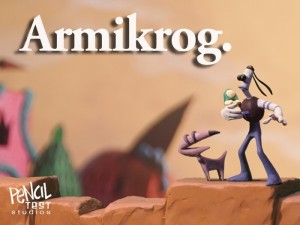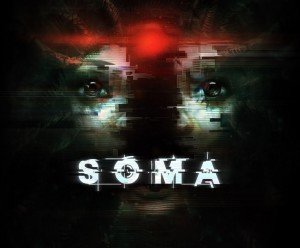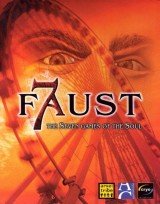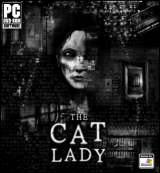Review for Aviary Attorney
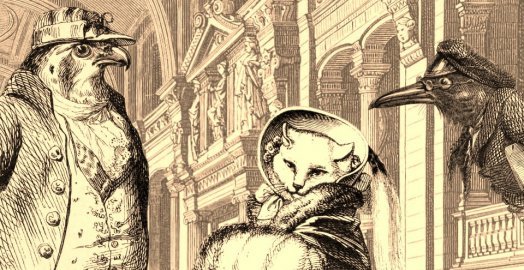
Game information
Adventure Gamers Awards
As the saying goes, imitation is the sincerest form of flattery, and no other adventure game in recent memory embodies this sentiment better than Sketchy Logic’s Aviary Attorney. Modeled on Capcom’s Phoenix Wright: Ace Attorney series, the game is so steeped in inspiration from the popular Nintendo courtroom drama that it offers instant familiarity to its players. But for all the obvious parallels, it also manages to set itself apart in key ways that make it… well, not superior but equally as accomplished as its Japanese counterpart, with a distinctive style all its own. Most importantly, the game succeeds at what is most important of all: creating a genuinely enjoyable world I couldn’t wait to spend time in as I played.
Taking place in 1840s France, the game sends players to a time and place not commonly found in the realm of interactive media. And Aviary Attorney takes full advantage of its unique setting beyond simply using it as a visual backdrop. France is buzzing with rumors of discontent over its monarchy, and of its class system favoring the bourgeois. Revolution is in the air, and it becomes a major theme in the game’s plot. This may be a game about an anthropomorphic bird lawyer, but arguing cases in front of a judge isn’t at the forefront of the plot during the game’s latter stages, which is by no means a bad thing.
As private defense attorney Jayjay Falcon, players must investigate murder cases and defend, to the best of their abilities, those accused of committing them by searching locations for clues, interviewing witnesses, following up on leads, and ultimately presenting a case on your day in court. But as the game moves along and the populace becomes more restless, Falcon’s cases take on a different tone, as he’s forced to put his lawyerly and investigative talents to work for the cause of France’s greater good. While gameplay elements remain the same throughout, there’s barely an actual courtroom in sight for much of the second half, and I found myself carried along in the story’s turbulent wake.
Basic gameplay in Aviary Attorney is fairly similar to its handheld predecessors. Much of the game is essentially a visual novel, with a fair amount of game-altering choices interspersed throughout. Once Falcon has been presented with a case, he and his ever-ravenous assistant Sparrowson hit the streets of Paris, traveling to various locations throughout the city on a hunt for clues to help piece together the truth of the murder and – hopefully – gather key evidence to exonerate their client.
The point-and-click mechanics, which usually involve advancing on-screen dialog but sometimes require clicking areas in the environment directly to have Falcon examine them, are as simple as they are sufficient for their purpose. This rudimentary investigative method is as close as you’ll ever get to scouring a crime scene, and the game will only allow you to do so at a small handful of locations scattered throughout the cases – usually no more than one or two per case. The clues and information you gather are available for perusal at any time in your inventory, though you won’t need to make use of it very much apart from trial days. Also included in the user interface are a log of characters you’ve met during your investigation and your wallet, for when the wheels of justice need a little greasing. Occasionally you’ll need to pull out your wallet to pay off a pesky official or acquire information from the poverty-stricken public. Should Falcon find himself running short on cash, he can head to the local pub to play a few rounds of a version of Blackjack, though an unlucky streak may lead to him losing all of his remaining money instead.
Courtroom scenes add a significant wrinkle that sets Aviary Attorney apart from Phoenix Wright, though they play out in much the same style. Witnesses give testimony for the crime in question, aided by the prosecuting attorney. After their statement, Falcon gets his turn to cross-examine the witness by choosing a particular part of the testimony to press for a bit more information. This, however, has to be approached with caution. Ask for information that leads nowhere, and the jury will start to lose faith in you and your case. Making a claim without the necessary evidence to back it up has the same result. And the jury is extremely fickle: too many missteps will result in an automatic “Guilty” verdict for your client. There is no on-screen meter to represent the jury’s state of mind, but the magic number of cross-examination mistakes seems to be three.
That part should sound familiar, but what really puts the pressure on in these situations, particularly if the jury has already expressed their annoyance once or twice, is the fact that the game carries on regardless of the verdict you secure. This seems like a small change, but the amount of tension it adds over the Capcom formula is no small matter. It is entirely possible, even probable, that you will lose some of your cases – and in 19th century France, that means your client’s life (no small-stakes cases here). Falcon will even make reference to the sting of a lost case going forward in the game. Then again, a “Not Guilty” verdict may not always be optimal; what if the defendant turns out to have really done the deed? Rarely did I feel fully comfortable with the outcome of a case, whether I had successfully defended my client or not. Had I truly served justice? More importantly, had the right parties been punished? These gray areas add a lovely little touch of emotional depth to what could have been a cut-and-dried affair.
For those seeking the “most perfect” run through the game, the developers have made it possible to return to any completed day – including the trial – and replay it making different choices, going for different verdicts. However, a less-than-perfect run of things is also an option; the game not only includes three different endings, but rather three entirely separate versions of the fourth (and final) case can be achieved, as determined by your choices made during the third case. With certain key characters either dead or alive by this time in the story, players will have an active hand in shaping the future of the entire nation by game’s end!
Each of the four cases is divided up into a set number of days, with the final day occupied by court proceedings. The days leading up to the trial are spent sleuthing around Paris, with locations falling into one of two categories: some locales can be visited at will, as often as you like, with no time penalty, though most locations will, when visited, take up a full day of your timeline. This is no problem early in the game – with three days before a trial it is a simple thing to visit three locations – but the restriction becomes more problematic later on. It becomes entirely possible, if your eleven days for investigating haven’t given you enough time to visit every available location, that you’ll show up in court without a key piece of evidence that would’ve otherwise refuted a false claim. Add to that the fact that characters react to your choices during investigation and may leave or refuse to help if you handle them incorrectly, and trial day becomes a malevolent force on your in-game calendar, always looming way too close for comfort. Combined with the permanence of your verdict, the responsibility resting on your shoulders often became an almost tangible weight to bear.
Yet all this stress is nicely balanced by expert use of humor throughout the game. Comedy is extremely difficult to create in video games, but Aviary Attorney has no shortage of it. Though none of it is voiced, the repartee between Falcon and Sparrowson in particular is a joy to follow, and it’s as heartfelt as it is funny. But even supporting characters aren’t given short shrift here: head prosecutor Séverin Cocorico is a pompous but sympathetic blowhard that you love to envy, and private investigator Renard Vulpes never misses an opportunity to make a profit, even while helping Falcon out of one predicament or another. There’s witty wordplay aplenty, and the writing remains top-notch throughout.
I’ve saved it for last, but the game’s presentation is certainly not the least of its strong points, either visually or musically. The all-animal cast is either taken from or inspired by the works of French caricaturist J.J. Grandville, and consists of impressively detailed pencil sketches. The graphics (which include backgrounds in the same hand-drawn style) show a high level of quality, with shading and cross-hatching that remind me heavily of paper currency design worldwide. All of this impressive art is presented against a yellowed backdrop, evoking the feeling of reading a scroll of parchment paper from that time period. It’s an effective approach that goes beyond mere gimmick to give the game a real “historical document” feel.
The musical score is similarly ooh la la, consisting of works by period-appropriate French composer Camille Saint-Saëns. Characters and locations have distinct themes, and every piece of music (starting with the title screen and main menu) has an inimitable authenticity that perfectly spices the game with that Parisian je ne sais quoi.
At seven hours, Aviary Attorney is longer than I had expected, though not quite as long as its bigger-budget contemporaries. Its cases are also more straightforward than those of Phoenix Wright, with fewer twists and turns by far. One of my few quibbles with game – and I feel as if I’m reaching here – is that the cases are a little unbalanced between investigation and trial. The day arguing the case in court is easily the longest of each case, with the investigation days being short by comparison. In fact, if you choose to travel to a location that holds no information whatsoever, an entire day of investigation might go by in only ten seconds of game time. This complaint is minor, however, and didn’t detract from my enjoyment of the game in the least.
Any other drawbacks are equally nitpicky. In place of spoken dialog, each character’s voice is emulated through a series of high- or low-pitched beeps, similar to the way dialog was often handled in 8- and 16-bit days of old. Each character has uniquely-pitched beeps and boops, and a small handful of these hit upon my ears in a grating way. A more serious issue came in the form of a bug that occurred several times when trying to continue a saved game from the very beginning of a case. In these instances – and it happened two or three separate times – the game would get hung up on the case’s opening cinematic and not progress, forcing me to replay the previous case’s trial section and continue through at least the first day of the new case, to avoid encountering the same save game bug on my next game session.
At the end of my time with Aviary Attorney, I was honestly sad to see the credits roll. It’s not that it uses a novel concept or a big budget for eye-popping effects. Rather, it focuses on all the right places – loveable characters, authentic charm befitting its setting, tense drama, and humor in spades – to make a rather unforgettable game, and certainly one that can stand next to those that so clearly inspired it with feathered head held high. It successfully created a world I looked forward to returning to each evening, one that I didn’t want to leave once it was over. If this is proof of the good can come of the French rising up, then I say “Viva la revolución!”











